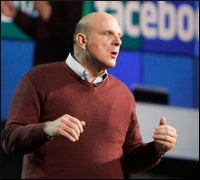 Microsoft CEO Steve Ballmer speaks at CES 2009. Source: Microsoft. Click to enlarge. |
Microsoft’s CEO Steve Ballmer announced Wednesday night that the long-awaited public beta test of Windows 7 has begun – although consumers will not be able to download it until Friday.
Beyond that, though, Ballmer’s first ever keynote speech at this year’s Consumer Electronics Show (CES) promised to be light on surprises – after all, his two biggest announcements leaked out before he ever got near a microphone.
No one was surprised that Microsoft announced the beginning of public beta testing for Windows 7, or that Microsoft (NASDAQ: MSFT) has just won a tough competition to be the default search engine service on Verizon Wireless phones. Both leaked out before the vociferous Ballmer had a chance to utter a word onstage.
Some observers had also expected Ballmer to announce the ship date for Windows 7, which would have certainly added more excitement to the keynote, but that didn’t happen.
Throughout his speech, Ballmer focused on the convergence of “the three screens” – that is PCs, phones, and the TV — as well as the cloud. “They’re evolving into a seamless ecosystem,” Ballmer said, adding that computers will soon, “in the next couple of years, be able to hear you and see you.
“Screens and displays will literally be everywhere and PCs, phones, TVs, and other devices will become a single experience,” he added.
Windows 7 reaches beta test
The public beta is available immediately for customers of Microsoft’s MSDN, TechBeta, and TechNet services. Friday, that will be opened up to consumers “globally,” he said.
While he did not give a delivery date for Windows 7, however, the beginning of the public beta is a good sign that it will be released to manufacturing, or RTMed, in early June, as first reported by InternetNews.com last September.
Despite leaking to the press in advance of Ballmer’s first ever keynote at CES 2009, however, both the Windows 7 and Verizon Wireless announcements are important strategic milestones for Microsoft.
In fact, both could be viewed as key moves in Microsoft’s business strategy to keep the company vital as well as profitable.
Windows 7 represents what may be Microsoft’s last chance to win back customers – both consumers and corporate – who were turned off by all of the problems swirling around Windows Vista. Indeed, so many IT shops shunned Vista that Ballmer was finally driven to tell them that it’s okay with him if they want to wait for Windows 7.
Next page: Can you hear me now?
Page 2 of 2
Can you hear me now?
Meanwhile, why is the Verizon Wireless agreement such a big deal for Microsoft? Not just bragging rights.
It is a rare glimmer of success for both its search and mobile strategies. Microsoft has struggled to win a tiny third-place position in the overall search marketplace, well behind both Google (NASDAQ: GOOG) and Yahoo (NASDAQ: YHOO). Additionally, the company is also behind in the mobile arena. The latest release of Windows Mobile, version 6.1, is far behind competitors’ offerings, with only a minor update to version 6.5 coming any time soon.
In one fell swoop, Microsoft’s deal with Verizon Wireless officially announced on Wednesday night, may breath new life into both search and mobile for the software titan. Not only is Verizon Wireless poised to become the nation’s largest wireless carrier later this week when it closes its acquisition of Alltel, but it apparently backed away from a rumored deal with Google last summer in favor of Microsoft.
Verizon Wireless is a joint venture between Verizon (NYSE: VZ) and Vodafone (NYSE: VOD).
“Verizon Wireless has selected Microsoft to provide portal, local and Internet search as well as mobile advertising services to customers on its devices,” said a joint statement issued Wednesday evening. The agreement, the companies said, runs for five years and begins sometime during the first half of 2009 – the point at which Microsoft’s Live Search is due to come out on Verizon Wireless handsets.
“Depending on which device they use, customers will be able to use voice commands and typed queries and use location-aware searches to receive … maps, directions, traffic information, information on local businesses, movie theatres and show times, gas prices and weather,” the statement said.
Besides providing search services, Microsoft will also manage search and display advertising on Verizon Wireless’ Mobile Web service.
“Users will access Live Search via a device’s home screen, by downloading an application or through Verizon Wireless’ Mobile Web service,” the statement continued.
That’s a big advantage for Microsoft, one analyst says. “It does give Microsoft a leg up [on Google and Yahoo Search] for the more casual user,” Charlene Li, industry analyst and founder of Altimeter Group, told InternetNews.com.
“By sheer convenience and placement, they’re [users] going to get exposure to Microsoft Search,” Li added.
Both firms declined to provide financial terms of the agreement.
Dell, Facebook deals
Ballmer was joined on stage by Robbie Bach, president of Microsoft’s Entertainment and Devices division, and the two made several smaller announcements as well.
Dell will begin offering PCs for consumers and small businesses in February preloaded with Windows Live Essentials, a suite of free services that provide instant messaging, e-mail and photo sharing, along with Live Search.
In addition, users will be able to share content they post on Facebook directly on Windows Live within the next few months.
Ballmer also said that, while the economy is definitely a serious concern, Microsoft does not plan to slash investment in product development.


